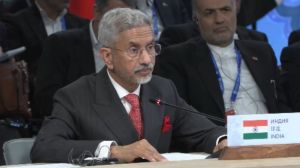The Governor’s loss of dignified self restraint
The interim orders passed by the Supreme Court on March 9, 2005 in the Jharkhand case once again raised important and controversial questio...

The interim orders passed by the Supreme Court on March 9, 2005 in the Jharkhand case once again raised important and controversial questions on the delicate balance of power that prevails between the three wings of Government. The Lok Sabha Speaker, Somnath Chatterjee has now proposed a meeting of all the Speakers to discuss this critical issue.
The Indian Constitution, unlike that of the United States, does not provide for strict separation of powers. Our Constitution was drafted on the expectation that a minimum standard of political decency would be maintained.
The sordid Jharkhand episode brought to the fore the extremely important role that has to be played by a Governor when election results do not throw-up a clear winner. The Constitution requires Governors to be men of stature and strong moral fibre.The infamous Ram Lal was the first brazen manifestation of the defiling of the Governor’s office. S.C. Jamir of Goa gave Manohar Parrikar just two days to prove his majority but Pratap Rane was given one month. In Jharkhand, Syed Sibtey Razi invited Shibu Soren to form a Government when he was not the head of single largest party and gave him three weeks to prove his majority. The appointment of a protem Speaker was also contrary to constitutional conventions. There is not a shadow of doubt that what happened in Jharkhand was completely illegal and unconstitutional.
The Constitution also never envisaged a situation where a handful of independent MLA could decide the fate of a Council of Ministers. In a hung assembly, the independent MLA is the luckiest person on the planet. Single, unattached, completely innocent of any sense of values, he is available to the highest bidder. Shockingly, none of these MLAs find it degrading or insulting that they should be so treated. The formation of a coalition Government and its trial of strength in the Assembly is an extremely delicate and sensitive matter. Constitutional propriety is thrown to the winds and there is a no holds-barred attempt to form a Council of Ministers.
In this background, one has to examine whether the Supreme Court ought to have refrained from interfering on the basis of Articles 122 and 212 of the Constitution of India. These two articles prohibit the court from making any enquiry of proceedings of Parliament or State Legislature on the grounds of irregularity of procedure. The Supreme Court has held that the courts can always enquire if the procedure is illegal. Nobody disputes that what was done in Jharkhand was blatantly illegal. Both these articles also prohibit the courts from making any enquiry against officers or members of Parliament who exercise power vested with them under the Constitution.This only means that as long as officers and members of Parliament (including the Speaker) exercise their power in accordance to the provisions of the Constitution, the court will not interfere. Therefore, if there are unruly scenes in a House, it is for the Speaker to take appropriate action.
But if the powers conferred on a Speaker or a member are exercised in utter violation of the Constitution, the courts will certainly be entitled to interfere. It is necessary to make a distinction between interference in the functioning of Parliament and State Legislature which has a duly constituted Speaker and Council of Ministers and a case like Jharkhand where the new Government had not been properly installed. There can be no interference in the day to day functioning of Parliament or the State Legislatures. The decisions taken by a Speaker cannot be interfered with nor can the courts pass any order to regulate the proceedings of the House.The Supreme Court or the High Courts will have the power to pass interim orders only in extraordinary situations as in the Jharkhand case.Indeed, over the last 50 years, the courts have been extremely reluctant to interfere in the functioning of either Parliament or the State Legislatures.
The separation of powers requires that each branch acts with dignified self-restraint and does not abuse the privileges that are conferred upon it. When the legislature discharges its function in the manner envisaged by the Constitution, there is absolutely no reason to interfere. If the conduct and manner in which a Council of Ministers is to be installed is in violation of constitutional norms, the courts will have to interfere. In doing so, it will not encroach upon the powers of the legislature. It will only prevent a breach of the Constitution. Therefore, if what happened in Jharkhand happens in other State Legislatures, the courts will be fully justified in interfering and passing interim orders.
The proposed meeting of all Speakers would do well to reflect upon the appalling fall in standards in the conduct and behaviour of Ministers and Governors.The manner in which the current legislatures function is of far greater national concern than one interim order passed by the Supreme Court. The Supreme Court did not cross the Lakshman Rekha in the Jharkand episode; it only prevented the murder of democracy and upheld the rule of law. And, in future, if there is an action replay of what happened in Jharkhand, then the Supreme Court and High Courts can, and indeed should, interfere.
The author is a Senior Advocate of the Madras High Court





- 01
- 02
- 03
- 04
- 05


























